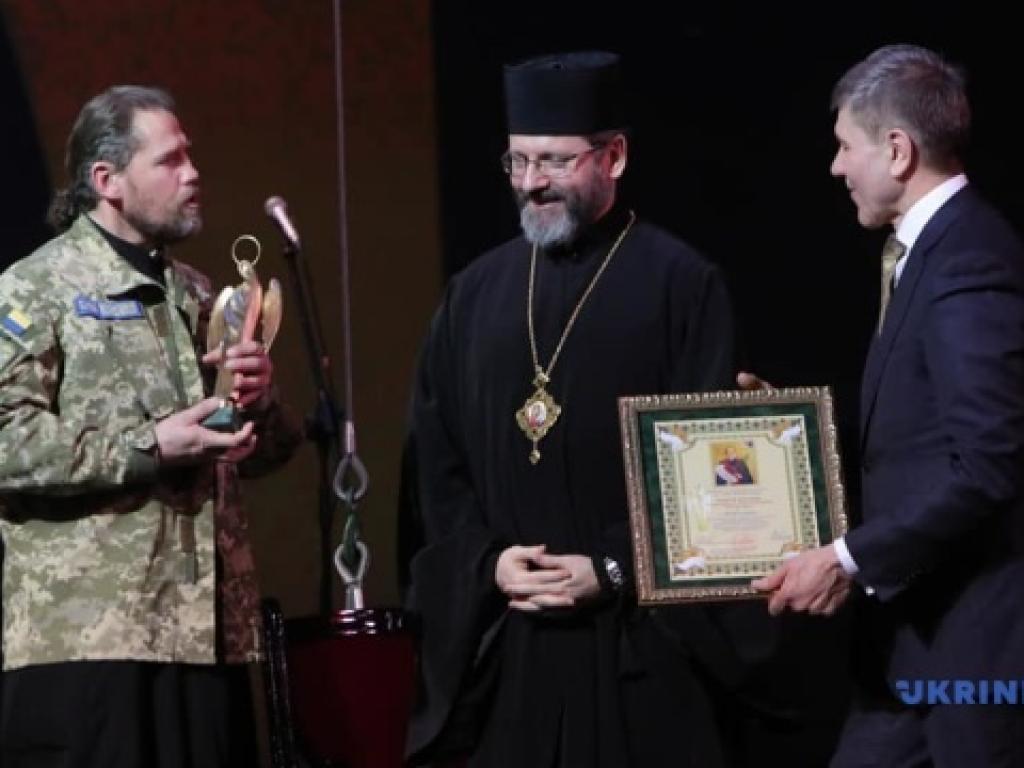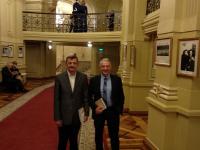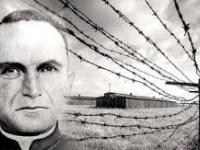On March 27, the VIII-th Ceremony of awarding the honours named after Blessed Sacred Martyr Omelyan Kovch was held in Kyiv.
Four military chaplains of various denominations became the laureates of the international honours of the Father Omelyan Kovch for outstanding humanitarian contribution.
VIII Ceremony of the award was held on March 27 at the National Opera of Ukraine.
"The purpose of this awarding is, on the one hand, by the popularization of his figure, because he is a national treasure, but on the other hand, we want to show that this individual is a voice of conscience of the Ukrainian people and believers today as well. Father Omelian embodies the idea of interethnic and interreligious dialogue and reconciliation. He entered history by saving Jews during the Holocaust - and for this was arrested and killed by the Nazis in the Majdanek concentration camp. We want to draw attention to another his distinction - as a military chaplain, for just this year a century passed from the moment of his chaplain service in the Ukrainian Galician Army," said the head of the Ukrainian Greek Catholic Church His Beatitude Sviatoslav (Shevchuk).
Omelyan Kovch is a Greek Catholic priest, but first and foremost, a man who serves as an example for all generations. He was a patriot and loyal to God, and his faith remained adamantine even in the most difficult life situations.
He was born on August 20, 1884, in the family of a priest in the largest Hutsul village - Kosmachi in Ivano-Frankivsk region. During 1905-1911 he studied at the Roman College of Saints Sergius and Bacchus. In 1910 he married the daughter of a Bukovynian priest Mary-Anna Dobryanska. The following year, he received the priestly ordinations from the hands of Bishop Hryhoriy Khomyshyn and began his pastoral work in Pidvolochysk; in 1912 he travelled to Bosnia to serve among the Ukrainian Greek Catholics in the Pridior district.
During the First World War, Father Kovch returned to Galicia, on Rohatynshchina, and in 1919 became the chaplain of the Ukrainian Galician Army. After uniting the UGA with the army of the UNR during the battles, he fell into the Soviet captivity, from which he managed to escape.
Returning to Galicia, Kovch was arrested by Poles and sent to a concentration camp. After liberation from the Polish concentration camp, for 20 years Omelyan Kovch lived and was a priest in Peremyshlyany. In 1922, he was appointed the pastor of this city.
At that time Peremyshlyany was a town of three nationalities - Ukrainian, Polish, and Jewish. Father Kovch made considerable efforts to help Ukrainians identify themselves: he raised funds for the rebuilding of the church, the reading room "Prosvita" and a cooperative in Korosni village were built on his initiative.
The Polish authorities did not like the Ukrainian priest's activities and views. In the house of Omelyan Kovch, police checks were frequent (during 1925-1934, nearly 40 searches were conducted), the pastor was imposed by short-term arrests and fines.
During the occupation of Galicia by Soviet troops in 1939, the priest continued to openly defend human rights, as far as possible, to defend his neighbours. Often parishioners did not understand their pastor. Considering that it was time to take revenge for the Polish regime's atrocities, they attempted to take away the property from the Poles, but Father Kovch condemned such actions that were encouraged by the Soviet authorities.
Arrested by NKVD Omelyan Kovch avoided possible death due to the bombing at the beginning of the German-Soviet war - this allowed him to escape from prison.
When the Nazis entered the Przemysliany and began mass extermination of Jews, Father Kovch appealed not to cooperate with the new government and not to take part in anti-Jewish actions, in spite of the Nazi resolutions, although those who helped the Jews, Nazis punished by death.
The expression of Father's personal courage was giving the refuge of Jews, especially children. The untrue baptismal certificates helped to save them from inevitable death. Although the baptism of the Jews was dangerous, Kovch consciously and openly baptized them. From 600 to 2000 Jews appealed to Kovch. There were many among them who went to this without religious beliefs, only in the hope of salvation. Other priests warned Kovch, advised not to baptize Jews publicly.
Arrested by NKVD Omelyan Kovch avoided possible death due to the bombing at the beginning of the German-Soviet war - this allowed him to escape from prison.
When the Nazis entered the Przemysliany and began mass extermination of Jews, Father Kovch appealed not to cooperate with the new government and not to take part in anti-Jewish actions, in spite of the Nazi resolutions, although those who helped the Jews, Nazis punished by death.
The expression of Father's personal courage was giving the refuge of Jews, especially children. The untrue baptismal certificates helped to save them from inevitable death. Although the baptism of the Jews was dangerous, Kovch consciously and openly baptized them. From 600 to 2000 Jews appealed to Kovch. There were many among them who went to this without religious beliefs, only in the hope of salvation. Other priests warned Kovch, advised not to baptize Jews publicly.
Omelyan Kovch's son, Miron reminded that he also asked his father to refrain from baptizing the Jews: "I say to my father - why these Jews still come, after all, they see, that either they are baptized or not baptized - the Germans do not pay attention to this, and they kill all of them all, more then, they catch those formerly baptized, even to the fourth and fifth generation of Jewish descent, but, baptizing Jews, Father takes the risk to be in threat of the German police."
December 30, 1942, O. Kovch was arrested by the Gestapo. Interrogated him in prison Prison on Łącki Street in Lviv. The father was demanded recognition of guilt and refusal of further baptism of Jews, as well as refusal to condemn the actions of the Nazi authorities. But he remained unbreakable.
The family and friends made every effort to release him from prison. Metropolitan Andrew Sheptytsky, personally joined this act. But the petition for salvation Father Omelyan was unsuccessful.
After refusing to sign an obligation to refuse to assist others, Kovch in August 1943 was taken to the Majdanek concentration camp near Lublin, where he was given the camp's number 2399. He considered being in a concentration camp as a mission. Here Omelyan shared the faith, hope and love with those frustrated, gave them Prosphora, confessed, communion, baptized all who needed. As a priest, he served all people, regardless of their origin and confessional affiliation.
Father Omelyan wrote in a letter to his relatives: "I understand that you are trying to relieve me, but I beg you not to do anything in this matter." Yesterday, they killed 50 people. "If I'm not here, who will help them pass these suffering? ... I thank God for His kindness to me. Except for heaven, this is the only place I would like to be. Here we are all equal - Poles, Jews, Ukrainians, Russians, Latvians, Estonians. Of all those present, I am the only priest here ... Here I see God that is the one and the same for all, regardless of the religious differences between us ... When I serve a Mass, they pray together. "
According to official data, Omelyan Kovch died on March 25, 1944, from phlegmon (acute purulent inflammation) of his right foot.
The world learned about Father Omelian Kovch when Pope John Paul II proclaimed him as a blissful martyr during his trip to Ukraine on September 9, 1999.
The Jewish Council of Ukraine has given him the title "Righteous of Ukraine" and in 2009 he was recognized as the patron of all priests of the Ukrainian Greek Catholic Church.









